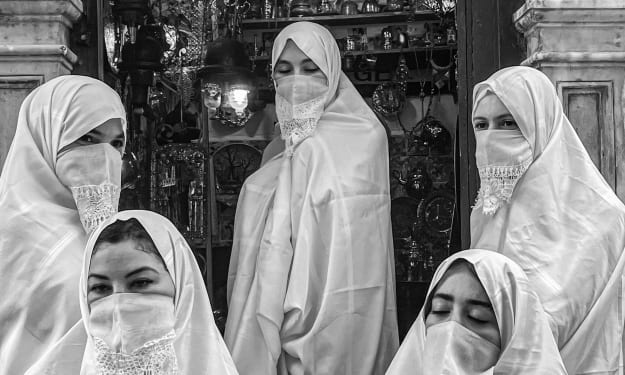Uplifting Women's Voices: How Rastafarian Culture is Empowering Women to Speak Out
Exploring the Role of Rastafarianism in Fostering Women's Empowerment and Amplifying their Voices in Society

Women's voices are crucial to shaping the discourse on important issues in today's society. However, women have historically been silenced, and many still face barriers to speaking out. In this post, we will explore how Rastafarian culture is uplifting women's voices and promoting gender equality.
Rastafarianism is a cultural movement that emerged in Jamaica in the early 20th century. It is a philosophy that emphasizes love, equality, and social justice. Rastafarianism has played an important role in the fight against colonialism and oppression, and it has also been instrumental in promoting gender equality and empowering women to speak out.
In this post, we will examine the ways in which Rastafarian culture is creating safe spaces for women to speak out, and how this is crucial for achieving gender equality and social justice.
Historical Context of Rastafarian Culture
Rastafarianism is a cultural movement that originated in Jamaica in the 1930s. It was born out of a desire to resist colonialism and oppression, and it drew inspiration from African culture, as well as Christian and Jewish traditions. Rastafarianism was heavily influenced by the teachings of Marcus Garvey, a Jamaican political leader who advocated for black pride and self-determination.
Rastafarianism is based on a set of beliefs and principles that emphasize love, equality, and social justice. Rastafarians believe that all human beings are equal, regardless of their race, gender, or social status. They also believe in the importance of living in harmony with nature, and they advocate for a simpler, more sustainable way of life. Rastafarianism is deeply rooted in spirituality, and Rastafarians often use marijuana as a sacrament in their religious practices.
Rastafarian culture has provided a platform for women to speak out against injustice and inequality. Rastafarians believe in the importance of empowering women and promoting gender equality. Women play a vital role in Rastafarian communities, and they are often involved in organizing cultural events, such as music festivals and poetry readings. Rastafarian women have also been at the forefront of political and social activism, fighting for the rights of marginalized communities and advocating for social justice. Through their activism and cultural contributions, women have helped to shape Rastafarian culture and promote gender equality.
Rastafarian Women Who Have Spoken Out
There are many notable Rastafarian women who have spoken out against social injustice and advocated for gender equality. One such woman is Queen Ifrica, a Jamaican reggae singer who is known for her socially conscious lyrics and her activism on behalf of women and marginalized communities. She has used her music to speak out against issues such as domestic violence and police brutality, and she has been a vocal advocate for women's reproductive rights.
Another notable Rastafarian woman is Sister Carol, a Jamaican-American reggae artist who has been active in the music industry since the 1980s. She has used her music to address issues such as poverty, racism, and gender inequality, and she has been a vocal advocate for women's empowerment and social justice.
These women have inspired others to speak out against oppression and discrimination. They have used their voices to raise awareness about important social issues and to advocate for change. Through their music and activism, they have helped to create a space where women can feel empowered to speak out and to make their voices heard.
Rastafarian women have faced many challenges in raising their voices. In many cases, they have been marginalized and silenced by patriarchal systems that do not value their perspectives or experiences. However, these women have overcome these challenges by standing together and supporting each other. They have formed networks of support and solidarity, and they have used their creativity and resourcefulness to find ways to make their voices heard. By continuing to speak out and advocate for change, Rastafarian women are creating a more just and equitable world for themselves and for future generations.
Creating a Safe Space for Women to Speak Out
Women often face systemic barriers that hinder their ability to share their thoughts and experiences. Therefore, it is essential to create safe spaces where women can express themselves freely without fear of judgment or persecution. These safe spaces allow women to build confidence, share experiences, and receive support from other women.
Rastafarian culture has always emphasized equality and respect for all human beings, regardless of gender. It has provided a platform for women to speak out against oppression and discrimination. Rastafarianism encourages women to embrace their identity and heritage, and their voices are heard in community gatherings, ceremonies, and music. Women are respected and valued in Rastafarian culture and are not discriminated against based on gender.
Gender-based violence and harassment are significant barriers that prevent women from speaking out. Therefore, it is essential to eliminate all forms of violence against women to create a safe space for them to share their thoughts and experiences. Rastafarianism recognizes the importance of eliminating gender-based violence and encourages men to respect women and treat them as equals.
The Impact of Uplifting Women's Voices in Society
Women often face systemic barriers that hinder their ability to share their thoughts and experiences. Therefore, it is essential to create safe spaces where women can express themselves freely without fear of judgment or persecution. These safe spaces allow women to build confidence, share experiences, and receive support from other women.
Rastafarian culture has always emphasized equality and respect for all human beings, regardless of gender. It has provided a platform for women to speak out against oppression and discrimination. Rastafarianism encourages women to embrace their identity and heritage, and their voices are heard in community gatherings, ceremonies, and music. Women are respected and valued in Rastafarian culture and are not discriminated against based on gender.
Gender-based violence and harassment are significant barriers that prevent women from speaking out. Therefore, it is essential to eliminate all forms of violence against women to create a safe space for them to share their thoughts and experiences. Rastafarianism recognizes the importance of eliminating gender-based violence and encourages men to respect women and treat them as equals.
Conclusion
The fight for gender equality and the empowerment of women's voices is an ongoing struggle in today's society. Rastafarian culture, with its principles of equality and respect for all human beings, has played a vital role in empowering women to speak out against oppression and discrimination.
Through the biographies of notable Rastafarian women who have advocated for social justice, we see how they have inspired others to raise their voices and bring about positive change in society. The importance of creating safe spaces for women to share their thoughts and experiences cannot be overstated, and Rastafarian culture has provided such a platform for women to express themselves freely.
It is imperative to eliminate gender-based violence and harassment to empower women to speak out without fear. The impact of uplifting women's voices can bring about positive change in society, and we must all join the movement to support the cause of gender equality and the empowerment of women's voices.
Let us work together to create a more just and equitable society, where all voices are heard and respected, and where women can thrive and contribute to their full potential.
Final Note
If you’re interested in exploring who is Jah and Rastafarian culture further, we invite you to check out Fifth Degree’s collection of Rastafarian clothing. Our clothing is designed to reflect the spirit and teachings of Rastafarianism, with bold colors, empowering messages, and a commitment to sustainability and ethical production. We believe that what you wear can be a powerful expression of your values and beliefs, and we’re proud to offer a range of high-quality, stylish, and socially conscious clothing for individuals who are seeking to live in harmony with nature and the divine. Visit our website today to learn more about our collection and find the perfect Rastafarian clothes for woman for you.
About the Creator
Enjoyed the story? Support the Creator.
Subscribe for free to receive all their stories in your feed. You could also pledge your support or give them a one-off tip, letting them know you appreciate their work.






Comments
There are no comments for this story
Be the first to respond and start the conversation.